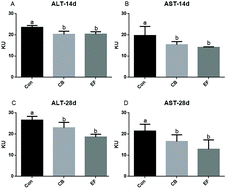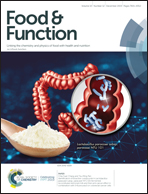Effects of Clostridium butyricum and Enterococcus faecalis on growth performance, immune function, intestinal morphology, volatile fatty acids, and intestinal flora in a piglet model
Abstract
We investigated the effects of Clostridium butyricum and Enterococcus faecalis (probiotics) in a piglet model. Weaned piglets (180) were randomly divided into three treatment groups and fed basal diet and basal diet supplemented with 6 × 109 CFU C. butyricum per kg and 2 × 1010 CFU E. faecalis per kg, respectively. The probiotics improved the final body weight, average daily gain, and feed conversion rate, while they reduced the diarrhea rate. The serum aspartate aminotransferase and alanine aminotransferase activities in probiotic-supplemented piglets were decreased on days 14 and 28. Piglets supplemented with probiotics presented an increased serum immunoglobulin (Ig)M level on day 14 and IgA, IgG, and IgM levels on day 28 compared with control piglets, respectively. Moreover, the probiotics increased the jejunal villus length and jejunal villus height to crypt depth ratio, while they decreased the jejunal crypt depth compared with those of the control. Similarly, an increase in inflammation-related pathway factor expression was observed after probiotic administration. Piglets supplemented with probiotics had a higher concentration of volatile fatty acids in the colonic contents than that in the control. High-throughput sequencing indicated that the probiotics modulated the colon bacterial diversity. Species richness and the alpha diversity index of bacterial samples in probiotic-supplemented piglets were higher than those in the control. Piglets supplemented with C. butyricum presented a considerably high relative abundance of C. butyricum compared with that in the control. Overall, C. butyricum and E. faecalis can promote growth performance, protect the intestinal villi morphology, improve immunity, and optimize the intestinal flora in weaned piglets.



 Please wait while we load your content...
Please wait while we load your content...